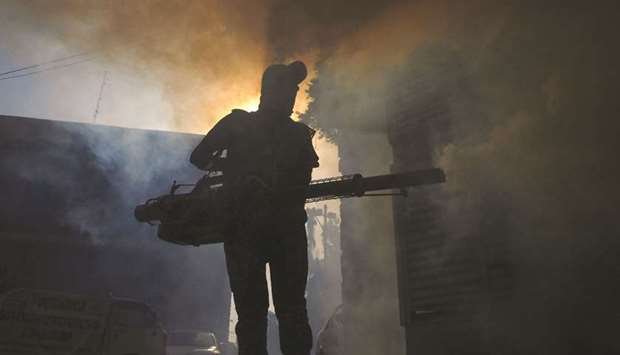At least 10,000 people have tested positive for dengue in Pakistan with the number of victims of the epidemic sweeping the country expected to rise in the coming days.
Addressing a press conference here yesterday, Special Assistant to Prime Minister on National Health Services, Regulations and Co-ordination Dr Zafar Mirza said that the federal government was in co-ordination with the provinces to curb the dengue outbreak, and that concerted efforts are being made to check it.
“A Dengue Control Operational Centre has been set up in Islamabad, which would daily review the dengue-related situation across the country review steps to control it,” he said.
He added that two hotlines will work round the clock, and expert doctors would respond to the dengue-related queries from the general public.
Speaking about the number of reported cases, Mirza said that there were 10,013 dengue patients at present in the country, including 2,363 in Punjab, 2,258 in Sindh, 1,814 in Khyber Pakhtunkhwa (KP), and 1,772 in Baluchistan.
“At present, our focus is to keep an eye on the outbreak,” he said.
He added that it is their responsibility to suggest preventive measures to the people, with the special hotlines set up for this purpose.
“Seventy per cent of the dengue patients in Punjab were reported from the Potohar region,” Mirza noted.
He further said that a special study or research would be conducted in the coming days to find out why dengue is widespread in this region.
“An emergency centre had been established at the National Institute of Health (NIH) 10 days ago, and the entire statistics are available on the NIH website on a daily basis,” Mirza assured.
Keeping in view the possible increase in the number of dengue patients, he said that owners of private hospitals in Islamabad have been contacted to ensure a total of 1,000 beds in their hospitals are available in case government hospitals run out of space.
Treatment at these private hospitals would be free of cost, Mirza said, thanking the management of private hospitals for this gesture.
Moreover, he said, 16 Basic Health Units in Islamabad are now in operation, and trained doctors are providing treatment to dengue and other patients.
He urged the people to visit these units for tests, following which the medical staff would guide them to the nearest hospital in case of any issue with them.
Mirza further said that the health department has been fumigating the most affected areas, while the federal government is in co-ordination with the provincial governments to curb the dengue outbreak and provide health facilities to patients.
“With a possible increase in the number of patients in the coming days, the situation should be in complete control till the end of this month,” he said.
Responding to question about the lack of rabies vaccine in the country, Mirza said that its production at the NIH would be doubled in coming years.
He lamented over the non-production of around 900,000 doses in the country during previous tenures, and assured that the incumbent government would take steps in this regard.
In response to another question about the increase in medicine prices, Mirza said that there is a price-fixing policy of medicines.
In May, prices of some medicines went up as much as 300%, but their prices have been brought down by 75%.
He said that the government is in contact with the manufactures and that prices of medicines would further decrease.

A worker fumigates a residential area of Karachi to kill mosquito larvae in the fight against the spread of dengue fever.
